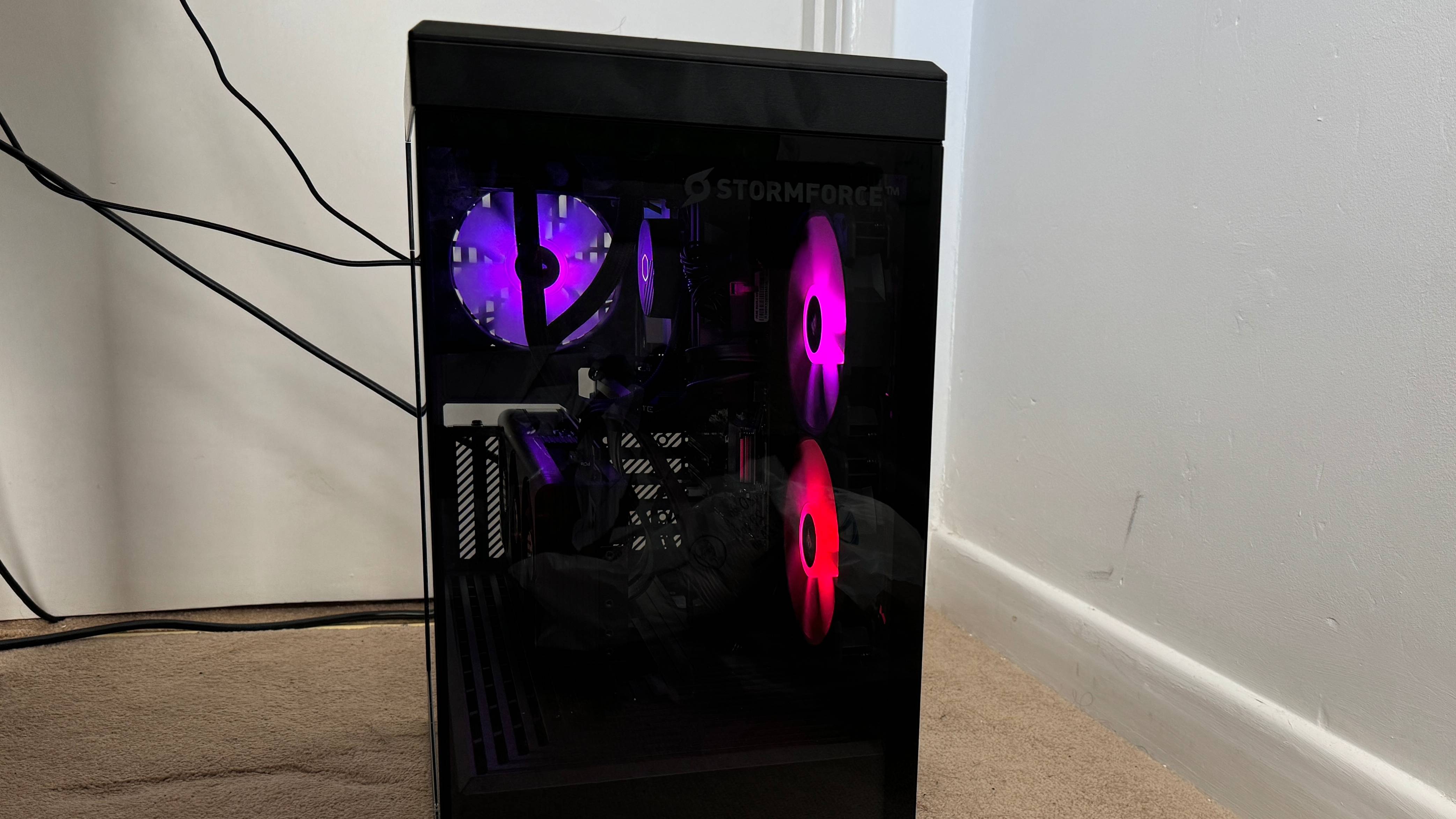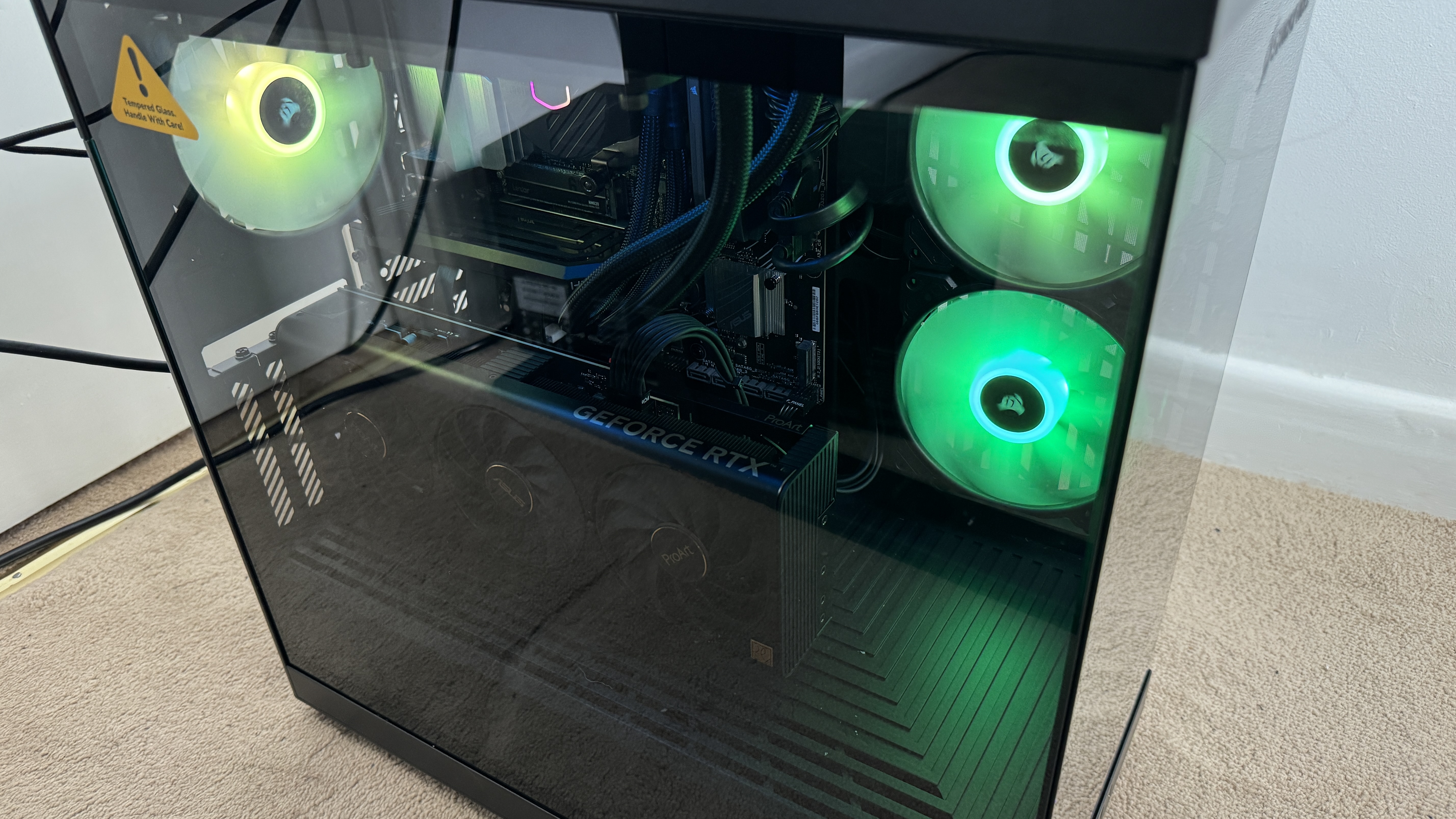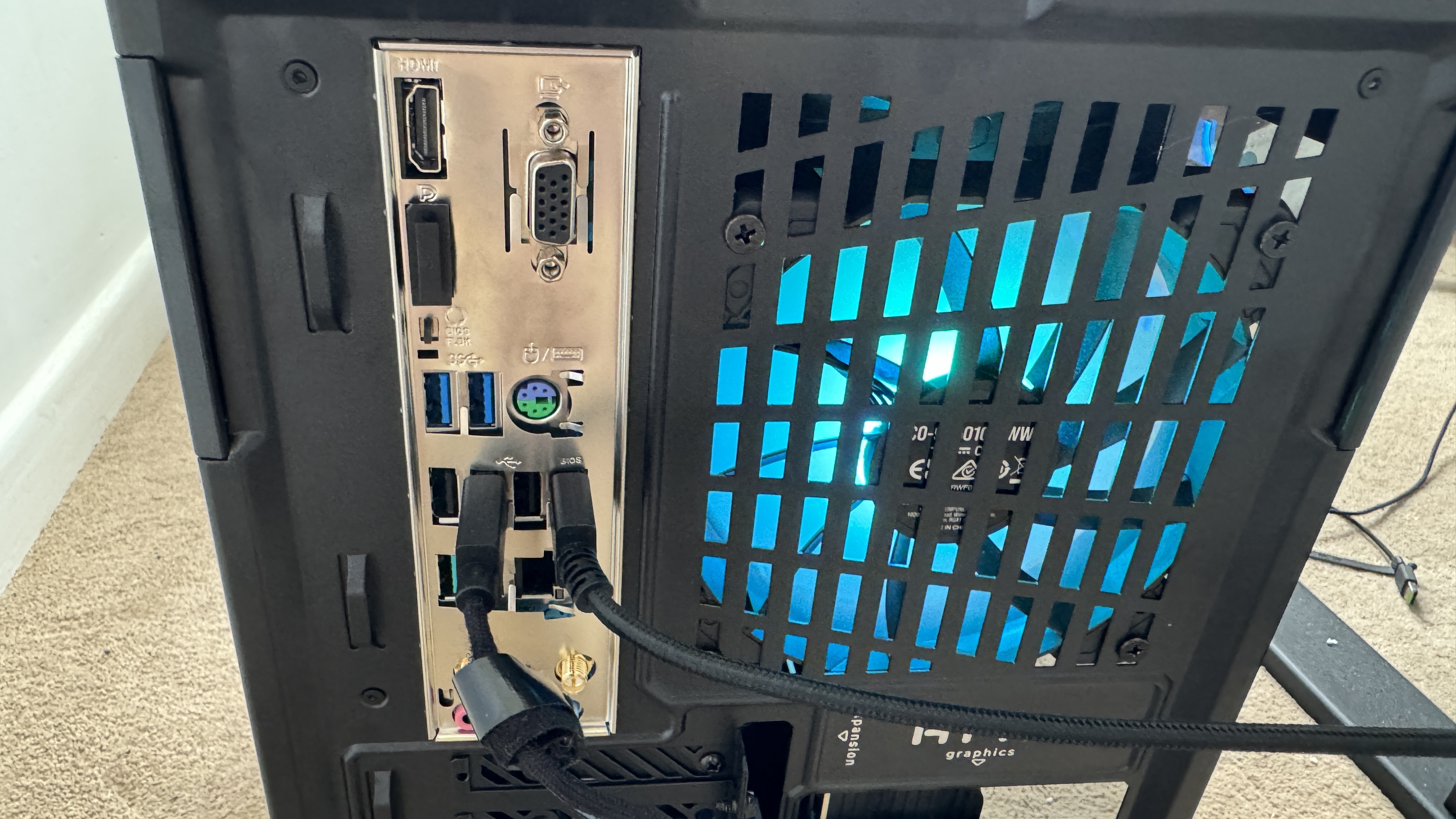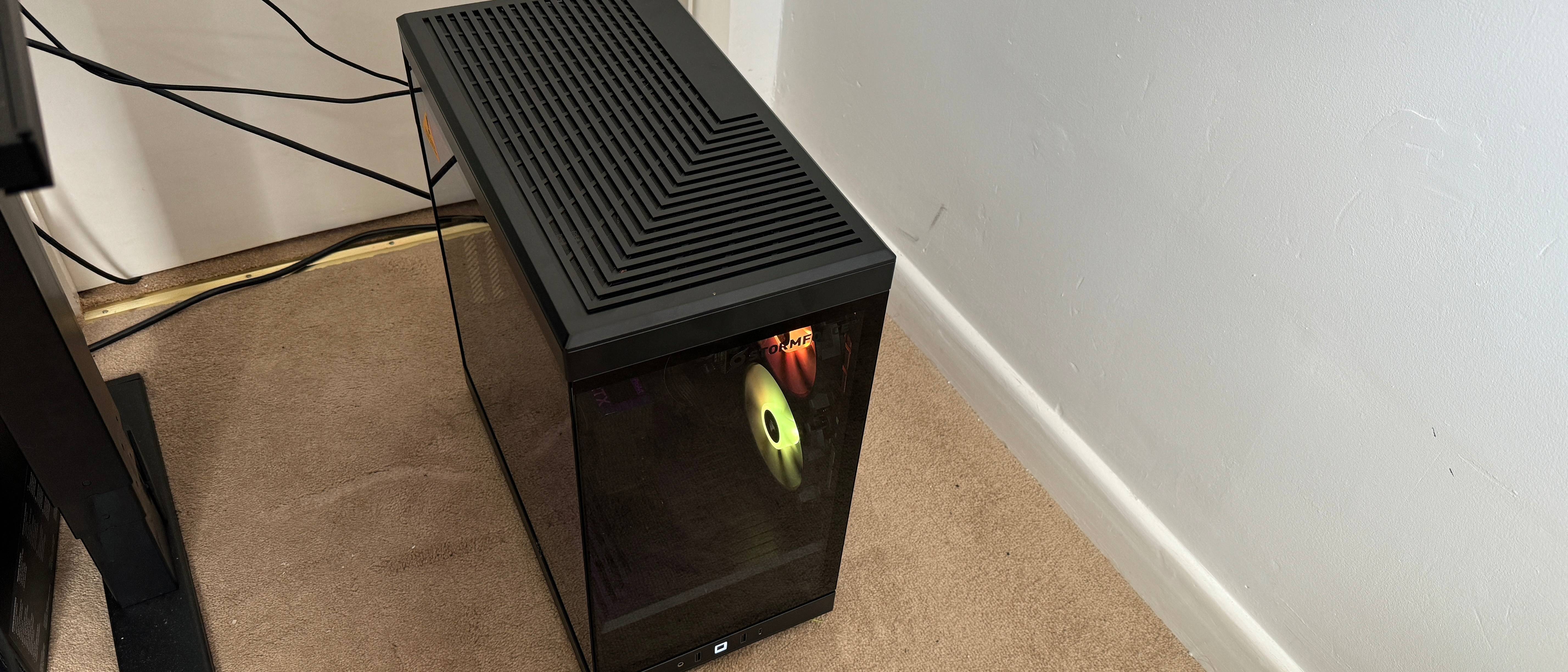TechRadar Verdict
The Stormforce Prism is a powerful compact gaming PC armed with an excellent CPU and GPU combo. However, it's held back by a middling SSD, loud fans, and weak front and rear connectivity options.
Pros
- +
The Hyte 40 case looks lovely
- +
Powerful 1440p performance
- +
Vertical GPU mounting is neat
Cons
- -
High price tag for a mid-range rig
- -
Gets really loud and warm
- -
Cheap motherboard and SSD choice
Why you can trust TechRadar
Stormforce Prism: Two-minute review
Building your own gaming PC can be a taxing and expensive process, especially if you're new to the world of components. That's where Stormforce has entered the conversation as experienced PC builders offering a range of custom-built and pre-made machines, of which the Prism is the latter option.
Starting with an RRP of £1,999.99, the Stormforce Prism doesn't come cheap when specced with an RTX 4070 Ti Super, 16GB of DDR5 RAM, and a Ryzen 7 7800X3D CPU. However, while it largely justifies that price tag in terms of performance, this rig is right on the cusp of what RTX 4080 Super PCs sell for, which will offer you much more performance and futureproofing in the long run. That's before getting into some of the drawbacks of the clear cost-saving measures on display here.
Yes, you're paying £2,000 at a minimum but not every penny has gone into putting the best tech in the Stormforce Prism for the asking price. This includes a fairly mediocre Asus Prime B650 mATX motherboard, complete with some outdated ports clogging up the silicon, a lacklustre DRAM-less Gen 4.0 NVMe SSD, and system RAM that's only a touch faster than what DDR4 could do a handful of years ago.
Fans of RGB lighting and small form-factor machines are going to be won over, though. That's because the Stormforce Prism features Corsair iCue SP120 RGB Elite case fans and the CoolerMaster MasterLiquid 240L Core ARGB AIO. Things are pretty, so if you want a gaming PC that looks the part then this one delivers. The Hyte Y40 isn't the most practical PC case, with limited ports and a somewhat cramped interior, but it's sleek enough thanks to vertical GPU mounting.
While the Stormforce Prism can't quite rival the best gaming PCs in terms of a price-to-performance perspective, it does enough as a dedicated 1440p machine catering to less experienced PC gamers. I would advise building a rig instead, in all honesty, but there's enough here to ultimately make this a solid enough option if you want something built and shipped to last the next handful of years.
Stormforce Prism: Price and availability

- How much does it cost? Starts at £1,999
- When is it available? It's out now
- Where can you get it? Available in the UK, but not the US or Australia
The Stormforce Prism 0503 is available with a starting price of £1,999.99, going up to £2,179.99. The entry-level variant offers 16GB of DDR5 RAM and a 1TB SSD, or you can double up to 32GB and a 2TB SSD. The asking price will also change when deciding whether to have Windows 11 Home pre-installed, or alternatively to source the OS yourself.
While not an entirely unfair price, the Stormforce Prism is definitely on the upper end of the spectrum considering its RTX 4070 Ti Super GPU inside. It's right up there with the asking price for the Alienware Aurora R16 for the spec. It's common to find more powerful RTX 4080 Super PCs around the £2,000 mark from the likes of CyberPowerPC and PC Specialist, so that's something to keep in mind.
- Value: 3 / 5
Stormforce Prism: Specs
| Header Cell - Column 0 | Base configuration | Review configuration | Top-end configuration |
|---|---|---|---|
| CPU | AMD Ryzen 7 7800X3D | AMD Ryzen 7 7800X3D | AMD Ryzen 7 7800X3D |
| GPU | RTX 4070 Ti Super | RTX 4070 Ti Super | RTX 4070 Ti Super |
| RAM | 16GB DDR5-5200 Corsair Vengeance | 32GB DDR5-5200 Corsair Vengeance | 32GB DDR5-5200 Corsair Vengeance |
| SSD | 1TB Gen 4.0 NVMe | 2TB Gen 4.0 NVMe | 2TB Gen 4.0 NVMe |
| Connectivity | 1200Mb/s WiFi, Wired Ethernet LAN Port | 1200Mb/s WiFi, Wired Ethernet LAN Port | 1200Mb/s WiFi, Wired Ethernet LAN Port |
| PSU | 850W Gold | 850W Gold | 850W Gold |
Stormforce Prism: Design and features

- Compact footprint with Hyte 40 PC case
- Nice vertical GPU mounting and RGB lighting
- Cheap choices with SSD, RAM, motherboard
The design of the Stormforce Prism gets a lot right on a surface level. Starting with the Hyte Y40 PC case, which is available in both white and black, the rig packs a punch with its mid-range hardware aimed at high-end 1440p gaming. That means a Ryzen 7 7800X3D CPU, an RTX 4070 Ti Super GPU, and either 16GB or 32GB of DDR5-5200 RAM. For £2,000, it's a touch expensive, but this PC should deliver where things matter most.
However, there have been a few clear compromises made in keeping the build cost down here which is disappointing considering the RRP. Stormforce claims there's a Gen 4.0 NVMe SSD inside, but in my performance testing, I was only able to verify speeds befitting Gen 3.0 (I'll come back to this later, though). The concessions extend to the choice of motherboard as well, an Asus Prime B650M ATX, which is a budget board with some seriously lacking connectivity options.
Simply put, the front and rear ports on this PC leave a lot to be desired. In terms of the latter, the rear inputs and outputs feature a slightly bulging backplate and some outdated options taking up otherwise valuable space. This means PS/2 and VGA ports that you'll likely never use, clogging up room which could have fit USB-C and more USB 3.2 ports.
The choice of RAM is fine but won't blow you away either. The boutique builder has opted for Corsair Vengeance clocked at 5,200 MT/s. It's about as basic as DDR5 comes, with some higher-end kits now running at or above the 8,000 MT/s mark. It's unlikely to make a massive difference, but you're barely getting above DDR4 rates here which is again disappointing for the price tag.
As touched on above, the vertical GPU mounting is a neat touch and proudly displays the RTX 4070 Ti Super inside. My review unit featured the Asus ProArt variant with a sleek black and gold colour scheme - it's cool, but not as chill as the Cooler Master ML240L RGB AIO. It's not the most powerful or largest all-in-one, but it should keep the CPU core temps down well enough, as the Ryzen chip has a 120W TDP.
Packing all this tech into a compact mid-tower means that the airflow isn't going to be as good, meaning higher temperatures. In my testing, I noted that the included SP120 RGB case fans got incredibly loud, but this isn't entirely unexpected. Even when doing something as simple as web browsing and working, there's a background whirring which can become frustrating. As you might guess, during intense gaming sessions, this PC sounds like a jet engine at full throttle.
- Design: 3 / 5
Stormforce Prism: Performance

- Fast 1440p gaming
- So-so productivity chops
- SSD lets the side down
Performance is paramount when it comes to a gaming PC and the Stormforce Prism delivers where it matters most. While the company claims you can expect "4K at medium settings" there are some major caveats with that assertion. Namely, you'll need to utilize DLSS and Frame Generation where possible for playable frame rates of 60fps.
Despite being built around the AD103 chip as with the RTX 4080 and RTX 4080 Super, the RTX 4070 Ti Super isn't quite on the same level. Think of this upgraded silicon as a way to push the video memory to 16GB (with 4GB extra over the 4070 Ti) rather than as getting 80-class performance for less. Said memory pool means you'll be able to push GPU-bound titles to impressive heights without compromise in 1440p.
Here's how the Stormforce Prism got on in our suite of industry-standard tests and game benchmarks.
CrossMark:
1,961 -Overall
1,848 - Productivity
2,209 - Creativity
1,637 - Responsiveness
3DMark:
FireStrike - 44,109
TimeSpy - 21,514
Port Royal - 15,656
Night Raid - 75,105
CrystalDiskMark:
Read - 3,418MB/s
Write - 3,070MB/s
PCMark10:
Overall - 8,619
Essentials - 10,987
Productivity - 10,045
Digital Content Creation - 15,741
Geekbench 6:
Single - 2,635
Multi - 14,370
Cinebench:
Single - 1,769
Multi - 17,435
Cyberpunk 2077:
RT Ultra - 1080p 188fps ; 1440p 116fps
Low - 1080p 228fps ; 1440p 153fps
Ultra - 1080p 160fps ; 1440p 91fps
Total War: Three Kingdoms:
Ultra - 1080p 196fps ; 1440p 96fps
Low - 1080p 569 ; 1440p 346fps
Red Dead Redemption II:
Ultra - 1080p 127fps ; 1440p 105fps
Low - 1080p 238fps ; 1440p 172fps
This is most evident in Cyberpunk 2077 and Red Dead Redemption II. While these titles are a handful of years old now, they still pack a punch in the visuals department and can sink weaker machines with their ultra textures and expansive game world sizes. Still, the Stormforce Prism achieved averages around the 100 fps mark or above in 1440p natively. Ray tracing is also possible when utilizing DLSS 3's Frame Generation and Ray Reconstruction for impressive averages as well.
CPU-bound games such as Total War: Three Kingdoms show where the onboard AMD Ryzen 7 7800X3D starts to sweat. This eight-core (16-thread) CPU should be enough for the next few years of games thanks to its second-generation 3D V-Cache stacked on the L3 module for enhanced single-core performance, but isn't quite leading-edge with its maximum boost clock of 5.0GHz. Still, Total War hit nearly 100 fps when maxed out in 1440p, which is likely enough for most people.
I touched on the choice of NVMe SSD before, and here's where it lets things down. While it's assumed to be a Gen 4.0 model, my testing revealed sequential performance of a Gen 3.0 at 3,418MB/s and 3,070MB/s read and write respectively. That's leagues behind the 7,500MB/s cap of Gen 4.0 and not even in the same ballpark as the best SSDs utilizing PCIe 5.0.
For context, the 2TB NVMe is fast enough, but as more modern games begin to utilize the DirectStorage API, which effectively eliminates loading times, you may be left in the dust in a few years. That's likely because the SSD is DRAM-less, hence its weaker performance. A saving grace here is that the motherboard has a spare NVMe slot, so upgrading shouldn't be too big a task when the time comes.
Lastly, as for productivity performance, you're going to be CPU-bound. In synthetic tests such as Cinebench, CrossMark, and PCMark10, the limits of the 7800X3D are on full display. If you're a seasoned content creator, you may be better suited to an alternative such as the 7900X (which is cheaper than ever as the Ryzen 9000 series is right around the corner).
- Performance: 4 / 5
Should you buy the Stormforce Prism?
| Attributes | Notes | Rating |
|---|---|---|
| Value | The Stormforce Prism isn't the most expensive RTX 4070 Ti Super-toting PC on the market, but it's definitely on that end of the spectrum, and you can get more for your money elsewhere, spec-wise. | 3 / 5 |
| Design | The Hyte Y40 case is neat, as are the RGB fans included with the AIO, but the barebones nature of the motherboard, RAM, and SSD choices are disappointing. | 3 / 5 |
| Performance | The Ryzen 7 7800X3D and RTX 4070 Ti Super are a great combo for high-end 1440p gaming, and this machine's no slouch where it matters. | 4 / 5 |
| Total | Ultimately, the Stormforce Prism gets a lot of things right, but some compromises let the overall package down given the RRP. | 3.5 / 5 |
Buy the Stormforce Prism if...
You want a compact and stylish 1440p powerhouse
The Stormforce Prism looks the part and offers a powerful performance for those wanting fast 1440p gaming and entry-level 4K in a snazzy form-factor.
You're a fan of RGB lighting
This boutique gaming PC features Corsair iCUE RGB case fans and the CoolerMaster MasterLiquid 240L ARGB AIO which makes the rig stand out from the crowd.
Don't buy the Stormforce Prism if...
You can find an RTX 4080 Super PC cheaper than this
Starting at £2,000, the Stormforce Prism is at the upper end of the pricing spectrum. You're likely to find an RTX 4080 Super machine for around the same price from boutique builders and trusted manufacturers if you shop around.
You want cutting-edge connectivity options
With its barebones motherboard, slow NVMe SSD, and middling RAM, the Stormforce Prism doesn't impress with its ports and performance outside of its gaming prowess.
- First reviewed June 2024

Formerly TechRadar Gaming's Hardware Editor, Aleksha McLoughlin is now a freelance writer and editor specializing in computing tech, video games, and E-commerce. As well as her many contributions to this site, you'll also find her work available on sister sites such as PC Gamer, GamesRadar, and Android Central. Additionally, more of her bylines can be found on Trusted Reviews, Dexerto, Expert Reviews, Techopedia, PC Guide, VideoGamer, and more.
